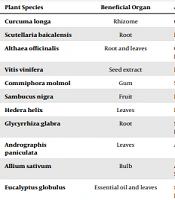Coronavirus disease 2019 (COVID-19) is a recently recognized strain of coronavirus leading to illness within the range of impacts similar to the common cold to fatal diseases, as a respiratory disease worldwide. The disease was recognized in early December 2019 for the first time. The World Health Organization (WHO) assessed it as a pandemic by the middle of March 2020 (1). Very limited permitted drugs are available with developed efficacy to treat COVID-19 and its complications. Different treatment modalities have been considered a result of the outbreak, such as traditional medicine and extensively utilized during the past epidemic outbreaks, like H1N1 influenza and severe acute respiratory syndrome (SARS) (2).
Certain medications are used for COVID-19, including dexamethasone and remdesivir as antiviral drugs, chloroquine/hydroxychloroquine as an antimalarials drug, and tocilizumab as an IL-6 receptor blocking monoclonal antibody, in different combinations as off-label medications for treating COVID-19. Although some of these drugs could reveal perfect effects to treat this disease, they are expensive.
Nevertheless, there is no specific treatment for COVID-19. Furthermore, health authorities and research institutes are trying to discover the best way for curing or preventing the disease. Herbal remedies may be considered a lower-cost source for managing COVID-19 (3). The involvement of the patient's immune systems with COVID-19 infection and a surging release of inflammatory cytokines have been observed during COVID-19 infection. Herbal medicines with immunomodulatory and anti-inflammatory effects could potentially be preventive and even therapeutic agents for COVID-19 patients (4, 5). There are few studies on herbal and natural medicines comprising certain active compounds with antiviral, antimicrobial, immunostimulatory, and anti-inflammatory activities. Some herbal drugs and their active components in treating COVID-19 are shown in Table 1. In this regard, luteolin and quercetin as natural flavonoids are widespread in some herbal medicine and also have the potential to treat COVID-19 (5-8).
| Plant Species | Beneficial Organ | Active components |
|---|---|---|
| Curcuma longa | Rhizome | Curcumin |
| Scutellaria baicalensis | Root | Baicalin, wagonin, steroids, and terpenoids (b-caryophyllene, scutebaicalin, b-sitosterol) |
| Althaea officinalis | Root and leaves | Galacturonorhamnans (rhamnogalacturonan), arabinans, glucans, arabinoglucans, flavonoids (isoscutellarein, luteolin, kaempferol, and hypolaetin), phenolic acids, coumarin (scopoletin), and tannins |
| Vitis vinifera | Seed extract | Proanthocyanidins and flavonoids |
| Commiphora molmol | Gum | Sesquiterpenes |
| Sambucus nigra | Fruit | Flavonoids (kaempferol, quercetin, astragalin, isoquercitrin, rutin, hyperoside) and triterpenes |
| Hedera helix | Leaves | Flavonoids, falcarinol, dehydrofalcarinol, and saponins |
| Glycyrrhiza glabra | Root | Saponins (glycyrrhizin), flavonoids (liquiritin, liquiritigenin, rhamnoliquirilin), triterpenes (glycyrrhetinic acid), and coumarins (licoaryl coumarin) |
| Andrographis paniculata | Leaves | Andrographolide, neoandrographolide, and flavonoids (flavanones, methoxylated flavones, chalcones). |
| Allium sativum | Bulb | Allicin, mercaptan, methyl allyl thiosulfinate, diallyl trisulfide, allyl methyl trisulfide, diallyl disulfide, and S-allyl cysteine sulphoxide |
| Eucalyptus globulus | Essential oil and leaves | 1,8-cineole, quercetin derivatives, phenolic acids (caffeic acid and ferulic acid), and tannins (gallic and protocatechuic acids) |
| Echinacea purpurea | Herb | Cichoric acid, caffeic acid, alkyl amides, and polysaccharides |
| Justicia pectoralis | Leaves | Coumarins (coumarin and umbelliferone), flavonoids ( quercetin, swertisin, and kaempferol), and lignans (justicidin B) |
| Magnolia officinalis | Bark | Magnolol and honokiol, and isoquinoline-type alkaloids |
| Pimpinella anisum | Fruit and essential oil | Essential oil (trans-anethole), flavonoids (vitexin and orientin), chlorogenic acid derivatives, coumarin derivatives, steroidal compounds, and triterpenes |
| Mikania glomerata | Leaves | Essential oil (germacrene D and b-caryophyllene) |
| Salix sp. | Bark | Salicin, (+)-catechin, syringin, and triandrin |
| Pelargonium sidoides | Root | Gallic acid, (+)-catechin, and methyl gallate |
| Zingiber officinale | Rhizome | Zingerone, gingerols, shogaols, paradols, wikstromol, and carinol |
Potential Herbal Medicines Against COVID-19
Some suggested mechanisms of medicinal plants are presented below that are effective in reducing COVID-19 infection symptoms: (1) immunomodulatory and anti-inflammatory features of the herbs containing quercetin, curcumin, and luteolin are caused by the inhibition of 3CL pro and interactions with viral hemagglutinin (HA) protein for inhibiting virus entry into the cell; (2) inhibition of the activation of RIG-I-like receptors (RLRs) signaling pathway induced by the virus: (Andrographis paniculata); (3) preventing replication, penetration, and adsorption of the virus (glycyrrhizin); (4) inhibition of the key mediators in the inflammation process, like TNF-a, IL-1b, IL-6, and IL-8 (Zingiber officinale and Justicia pectoralis); (5) increasing the lymphocytes proliferation and producing IL-2: (Andrographis paniculata); (6) inhibiting the tumor cell proliferation by the immune system: (Andrographis paniculata) (5, 7, 9).
Considering the meta-analysis studies and systematic reviews, adding herbal remedies to standard care improves the COVID-19 patients’ signs and symptoms, reduces the inflammatory markers and C-reactive protein (CRP) levels, and improves lung function while preventing future damage to the lung, like fibrosis. Some studies even suggested that herbal drugs as supplement therapy may decrease the hospitalization period and the fatality rate compared to the chemical drugs.
According to the meta-analysis studies, significant impacts of the integrated treatment of herbal medicine with chemical drugs after intervening for the total effective rate included the traditional Chinese medicine (TCM) syndrome score (fever, cough, fatigue, and dry and sore throat), disappearance rate (cough and sputum production), complete blood count, including white blood cell and lymphocyte counts, lymphocyte percentage, and levels of procalcitonin and CRP) (9-13).
In conclusion, herbal drugs have been considered an available source to treat diseases, like COVID-19. However, clinical investigations are needed for evaluating the safety and efficacy of traditional and herbal medicine for providing clinical evidence. Then, regulatory authorities' approval is needed. Such intervention may assist in decreasing the disease length and present an affordable treatment regimen for patients. Combining herbal and traditional medicine into conventional therapy may be another method for treating COVID-19 in the future.
